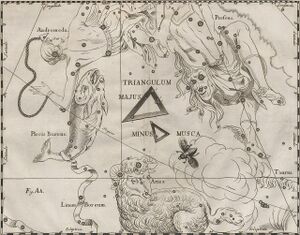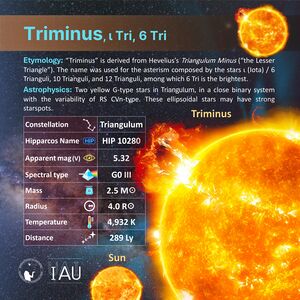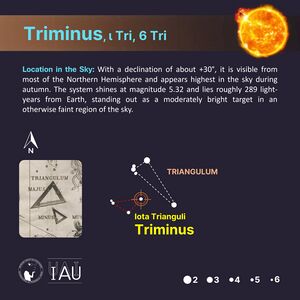Triminus: Difference between revisions
No edit summary |
No edit summary |
||
| Line 1: | Line 1: | ||
[[File:Triangulum+Fly+Aries Hevelius1690.jpg|thumb|Aries and Triangulum in Hevelius (1690).]] |
[[File:Triangulum+Fly+Aries Hevelius1690.jpg|thumb|Aries and Triangulum in Hevelius (1690).]] |
||
[[File:Triminus profileCard SadeghFaghanpour-IAU-WGSN.jpg.jpg|thumb|Triminus profile card (CC BY Sadegh Faghanpour for IAU WGSN).]] |
|||
Triminus is a modern star name adopted by the International Astronomical Union in the IAU-Catalog of Star Names (IAU-CSN). Its origin is Latin. It is the name of HIP 10280 (6 Tri, HR 642) in constellation Tri. |
Triminus is a modern star name adopted by the International Astronomical Union in the IAU-Catalog of Star Names (IAU-CSN). Its origin is Latin. It is the name of HIP 10280 (6 Tri, HR 642) in constellation Tri. |
||
==Concordance, Etymology, History== |
==Concordance, Etymology, History== |
||
[[File:Triminus stickfigure SadeghFaghanpour-IAU-WGSN.jpg|thumb|Triminus stickfigure (CC BY Sadegh Faghanpour for IAU WGSN).]] |
|||
In Early Modern Europe, a huge variety emerged in the drawing styles of classical constellations, while simultaneously new constellations were created. The atlas edition by Hevelius shows the classical constellation of The Triangle ([[Triangulum]]) as a set of two triangles. They are labelled "Majus" and "Minus" where "Majus" refers to the classical asterism. |
In Early Modern Europe, a huge variety emerged in the drawing styles of classical constellations, while simultaneously new constellations were created. The atlas edition by Hevelius shows the classical constellation of The Triangle ([[Triangulum]]) as a set of two triangles. They are labelled "Majus" and "Minus" where "Majus" refers to the classical asterism. |
||
Latest revision as of 15:56, 4 September 2025
Triminus is a modern star name adopted by the International Astronomical Union in the IAU-Catalog of Star Names (IAU-CSN). Its origin is Latin. It is the name of HIP 10280 (6 Tri, HR 642) in constellation Tri.
Concordance, Etymology, History
In Early Modern Europe, a huge variety emerged in the drawing styles of classical constellations, while simultaneously new constellations were created. The atlas edition by Hevelius shows the classical constellation of The Triangle (Triangulum) as a set of two triangles. They are labelled "Majus" and "Minus" where "Majus" refers to the classical asterism.
It was suggested to the IAU to use the lesser triangle to name one of the stars that formed it. The brightest one among them would be 6 Tri (ι Tri). The full name "Triangulum Minus" would be too long, consist of two words and would cause confusion with the IAU-constellation "Triangulum". Therefore, it was suggested to abbreviate the constellation name with the standardised three letter-system and merge the two terms to the resulting name "Triminus".
Mythology
IAU Working Group on Star Names
The name was suggested to the IAU in 2023 and accepted by the IAU WGSN in 2025.
Weblinks
Reference
- References (general)
- References (early modern)
- Ian Ridpath's website (Star Tales )







